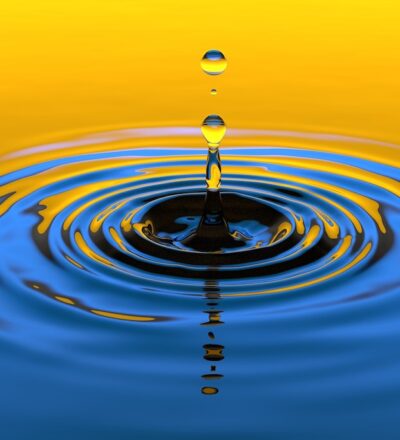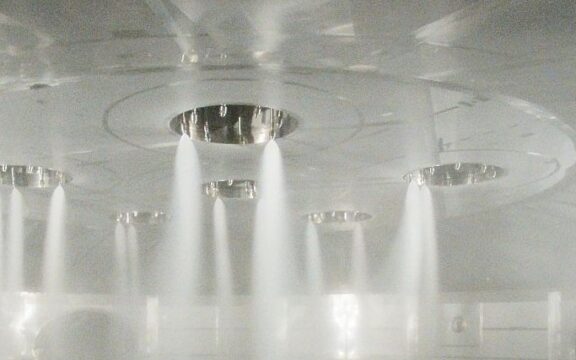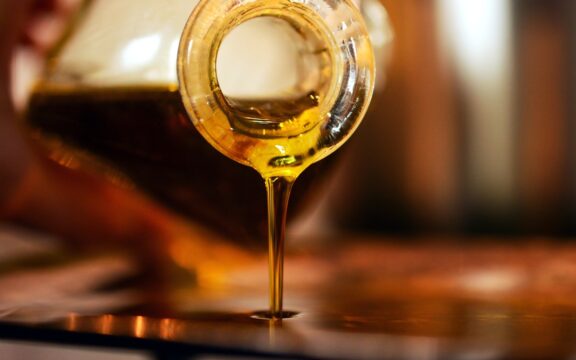Our planet runs on water and so do many industrial processes. However, clean fresh water is often not available where and when humans need it and in many parts of the world it is a scarce commodity. So, reducing the water footprint, for instance through re-using process water, is an important issue in industrial water use.
Sustainable water concentrates on the development of natural, chemical-free treatment technologies for drinking water, waste water and cooling water. The industrial processing of water is often accompanied by abundant energy consumption and associated CO2 emissions, in particular when it comes to drying. A maybe even greater challenge in water processing is reducing the emission of substances that may be harmful to the environment, as well as the recovery and reuse of valuable components from water.
More than 20% of all drinking water is currently used by the industry
What is industrial water usage?
Industrial water, also known as industrial process water, is water used in industrial processes that is not sourced from the drinking water supply. It is commonly employed for activities such as fabricating, processing, washing, diluting, cooling, or transporting a product; incorporating water into a product; or for sanitation needs within the manufacturing facility.
According to Technische Unie (2024), the Dutch industry consumes approximately 386 million cubic meters of water per day. This accounts for about 20% of the total water consumption in the Netherlands. While industrial water usage has slightly decreased in recent years, it still surpasses household water consumption.
The breakdown of water usage in the industry is as follows:
- Cooling installations: 35%
- Production processes: 25%
- Wastewater cleaning: 20%
- Irrigation: 20%
The key water-consuming industries in the Netherlands include:
- Chemical industry
- Food industry
- Metal industry
- Energy sector
Source: Technische Unie
Our vision
In a world where the demand for freshwater for human activities is rising and the impacts of climate change are becoming more pronounced, many regions are struggling to meet their freshwater needs. This challenge extends beyond natural and drinking water concerns to also include industrial water usage.
Industrial partners must source water and manage contamination, often facing stricter regulations due to pollutants like PFAS in surface water. The goal for industrial companies is to treat water during their processes, ensuring it is clean before discharge.
Since 2008, when one of the first ISPT projects focused on improving wastewater treatment at Chemelot, the vision has been clear: to develop sustainable, innovative water solutions that meet industrial needs while safeguarding our water resources for future generations.
Water and Sustainability
No matter where you are in the Netherlands, water is always nearby. The Dutch have a long history of living with water and have accumulated extensive knowledge and experience in water management. This expertise has earned the Netherlands a reputation as a global leader in managing wetlands and making it the best-protected delta in the world. With over a quarter of its territory below sea level, the Netherlands has, over the decades, mastered the art of making efficient and effective use of water.
However, today, climate change is causing droughts, salinization, an increased risk of flooding, and land subsidence. According to RIVM, our water supply is under strain due to climate change and pollution, leading to regional shortages. If measures are not taken, the entire Netherlands could face water shortages by 2030.
Source: Rijksoverheid, Delta Programme
Our programs
Drying and dewatering
All kinds of products and processes require drying, varying from vegetables and dairy products to paper. Our program Drying and Dewatering aims to reduce use of water and energy. It explores, for instance, the possibilities for residual heat usage and the application of heat pumps. At the same time, there is a strong focus on the implementation of drying technologies that can reduce energy use. Fluidised bed drying, microwave drying, vacuum drum drying and refractance window drying are just a few of the options.
The program has a strong focus on realizing cost-effective R&D and ensuring the effective and rapid transfer of technology from the laboratory to industrial practice. This includes a close partnership with the Dutch working society on drying Nederlandse Werkgroep Drogen (NWGD), to realise the joint ambition of innovation in the area of drying technology in the Netherlands.
Sustainable water processing
In our program Separations for Circularity, water processing is among the subjects studied. It has a focus on improving efficiency, reducing the water footprint, and optimising resource recovery from watery process streams. This fits within the programs mission to accelerate the development of radically innovative technologies for the separation and treatment of fluids.
Among the technologies developed are, for instance, various membrane separation technologies, freeze crystallization and vapor recompression. These can help reduce energy usage, enable a shift towards the use of renewable electricity, and can provide a cost-effective means to establish water circularity.
Partner example
A notable example of water innovation stems for our EBI project, in this case in collaboration with RIWA-Rijn, for which researcher Berber Postma is diving into water data from the Rhine River. The focus is on providing evidence-based insights to address water quality issues. “We look for trends to identify sources of pollution. The aim of RIWA-Rijn, together with the International Commission for Protection of the Rhine, is to reduce the quantities of certain pollutants in the Rhine by 30% in 2040.”
Current ISPT projects on water processing and separations
Recovr
ReCoVR designs and develops innovative materials and technologies for the selective recovery of high-value molecules. Our electrified separation technologies are crucial for enhancing circularity and efficiency in various industrial processes. We utilize advanced precision separation techniques, including absorbers, adsorbers, membranes, and affinity fluid separation technologies. These state-of-the-art solutions are essential for making industrial processes more sustainable and circular.
ReBBloCS
Producing bulk and platform chemicals from waste streams currently incinerated or landfilled can significantly reduce CO2 emissions along product value chains. The ReBBloCS project aims to create new circular value chains by converting complex and mixed waste streams into valuable chemicals using innovative technologies. Given the current insufficiency of waste streams to meet industrial demand for circular chemicals, the project focuses on efficiently utilizing all available alternative, circular, and renewable feedstocks, including complex and wet waste streams.
Key water innovation fields
Biobased Economy
In a biobased circular industry, many processes occur in aqueous environments (aqueous streams). For example, in bio-refinery, lactic acid can be produced from a mixture of sugars and salts. The sugar serves as the feed for the microorganisms. Salts need to be retained in the water to create a suitable environment for the microorganisms (acting as a pH buffer). The goal is to extract the acid while allowing the sugars and salts to be recycled.
Ensuring Clean and Safe Water
Climate change, urbanization, and pollution challenge water supply and wastewater treatment. This theme focuses on developing innovations to make water supply and treatment climate-resilient and sustainable. Key areas include measuring and removing emerging contaminants, enhancing natural purification, balancing water demand and supply, and exploring alternative water sources.
Reusing Water and Resources
Efficient water and resource reuse is vital. Innovations focus on recovering nutrients like nitrogen, phosphorus, and potassium from wastewater and sludge to close nutrient cycles. Techniques for selective removal of unwanted substances from wastewater can prevent harmful contamination and promote reuse of wastewater and greywater.
Generating and Storing Energy with Water
By 2030, water will play a key role in energy and climate policy. This theme explores using surface and groundwater as sources of sustainable energy and heat, and as storage mediums. Innovations include aquathermy, energy generation from water (e.g., salt gradient, geothermal, biogas), and feasibility studies on these methods.
Plant-Based Economy
Plants generally contain about 50% water. Extracting valuable molecules from plants involves complex separation processes, including dealing with water. For example, levulinic acid is used as a solvent in cleaning agents. There are two types of streams: aqueous streams, which are mostly water with very diluted substances, and wet streams, which contain water.
Smart Measurement and Management for Water and Infrastructure
ICT innovations are essential for sustainable water management. This theme focuses on smart detection methods, self-learning sensor networks, and data-driven alarm systems for water safety. Innovative technologies for monitoring and control support efficient system management, pollution source mitigation, and strategic decision-making for infrastructure maintenance.
Source: TKI Watertechnology, KWR Water,
Interesting reads and podcast
- Podcast 225 years of Rijkswaterstaat (in Dutch)
- Natuur&Milieu: Water scarcity and drought in The Netherlands (in Dutch)
- Report: Industriewater in Nederland (2009) (in Dutch)


